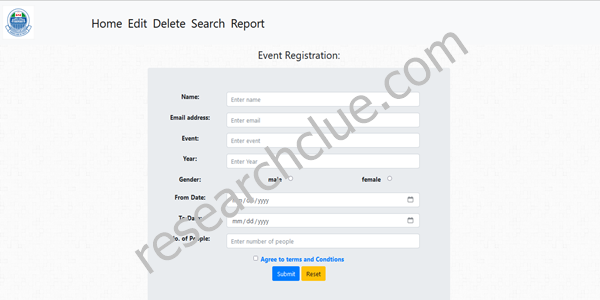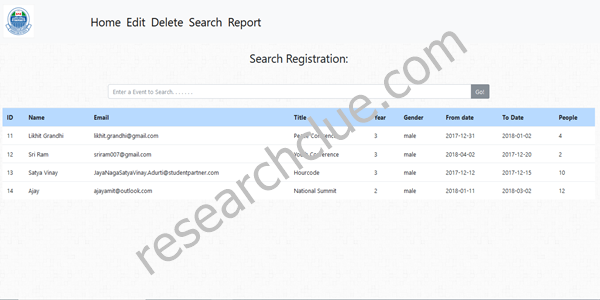ABSTRACT
The paper examines Design and Implementation of an online Campus Event Notification System. Considering the numerous challenges campuses face in getting to know about upcoming campus events, the paper aims at developing a secure and convenient management system where students, lecturers and other stakeholders can showcase events happening on campus in real time. Considering technology used in implementing this work, the researcher used HTML, CSS, SQL and PHP. These technologies were considered because of its robust and simplicity in solving complex issues faced by many campuses in Nigeria.
CHAPTER ONE
INTRODUCTION
1.1 Background to the Study
In today's dynamic educational landscape, organizing and managing campus events is essential for fostering a vibrant and engaged campus community. Effective communication and coordination are paramount to ensure that students, faculty, and staff are informed about upcoming events and opportunities for involvement. Traditional methods of event notification, such as posters, flyers, and email announcements, often struggle to reach all members of the campus community in a timely and engaging manner. To address these challenges, the design and implementation of an online Campus Event Notification System (CENS) emerge as a pivotal solution. This system leverages digital technologies to streamline the process of disseminating event information, facilitating communication, and enhancing participation across the campus.
The implementation of an online CENS offers several advantages over conventional methods. Firstly, it provides a centralized platform accessible to all members of the campus community, allowing them to stay informed about upcoming events conveniently from any internet-enabled device. Whether it's academic lectures, cultural performances, or student club activities, the CENS serves as a hub for aggregating and disseminating event information in real-time. Secondly, the digital nature of the system enables targeted communication and personalized notifications based on user preferences and interests, enhancing engagement and participation in campus events (Smith & Jones, 2020). Additionally, features such as event calendars, RSVP capabilities, and integration with social media platforms further enrich the user experience and promote community interaction (Brown et al., 2019). By leveraging digital technologies, the CENS transforms event management and communication, fostering a more vibrant and inclusive campus culture.
1.2 Statement of the Problem
In the contemporary educational environment, the effective dissemination of event information on campus poses a significant challenge. Traditional methods of event notification, such as posters, flyers, and email announcements, often fail to reach all members of the campus community in a timely and engaging manner. This lack of effective communication leads to missed opportunities for involvement and participation in campus events among students, faculty, and staff. Additionally, the decentralized nature of event promotion can result in fragmentation and inconsistency in the dissemination of event information across various departments and organizations on campus. Consequently, there is a pressing need for a centralized and efficient solution to streamline the process of event notification and improve engagement with campus events.
Addressing these challenges requires the design and implementation of an online Campus Event Notification System (CENS) that leverages digital technologies to enhance communication and engagement. Such a system should provide a centralized platform accessible to all members of the campus community, offering real-time updates and personalized notifications about upcoming events. Furthermore, the CENS should incorporate features such as event calendars, RSVP capabilities, and integration with social media platforms to enrich the user experience and promote community interaction. By addressing these key issues, the CENS aims to improve the dissemination of event information, increase participation in campus events, and foster a more vibrant and inclusive campus culture.
1.3 Objectives of the Study
The main objective of the study is to examine Design and Implementation of an online Campus Event Notification System (A case study of works Department, University of Lagos). Specific objectives of the study are:
- To design a well-structured and optimized database management system to store, process and retrieve events on campuses in real-time.
- To design and Implement a secure management information system not prone to internal and external attacks.
- To create a fast query system where students, lectuturers and other stakeholders can search for events within their campus in real-time.
- To proffer solutions to the challenges and enhance already existing systems in place.
SCREEN SHOTS OF THE APPLICATION


1.4 Significance of the Study
The study is important for many reasons. The following are the major stakeholders this paper through its practical and theoretical implications and findings will be of great significance:
Firstly, the paper will benefit major stakeholders and policy makers in the Information Technology sector. The various analysis, findings and discussions outlined in this paper will serve as a guide in enabling major positive changes in the industry and sub-sectors.
Secondly, the paper is also beneficial to the organizations used for the research. Since first hand data was gotten and analysed from the organization, they stand a chance to benefit directly from the findings of the study in respect to their various organizations. These findings will fast track growth and enable productivity in the organisations used as a case study.
Finally, the paper will serve as a guide to other researchers willing to research further into the subject matter. Through the conclusions, limitations and gaps identified in the subject matter, other student and independent researchers can have a well laid foundation to conduct further studies.
1.7 Scope of the Study
The study is delimited to the University of lagos main campus. Findings and recommendations from the study reflects the views and opinions of respondents sampled in the area. It may not reflect the entire picture in the population.
1.8 Limitations of the Study
The major limitations of the research study are time, financial constraints and delays from respondents. The researcher had difficulties combining lectures with field work. Financial constraints in form of getting adequate funds and sponsors to print questionnaires, hold Focus group discussions and logistics was recorded. Finally, respondents were a bit reluctant in filling questionnaires and submitting them on time. This delayed the project work a bit.
1.9 Organization of the Study
The study is made up of five (5) Chapters. Chapter one of the study gives a general introduction to the subject matter, background to the problem as well as a detailed problem statement of the research. This chapter also sets the objectives of the paper in motion detailing out the significance and scope of the paper.
Chapter Two of the paper entails the review of related literature with regards to corporate governance and integrated reporting. This chapter outlines the conceptual reviews, theoretical reviews and empirical reviews of the study.
Chapter three focuses on the methodology and analysis of the existing system. This gives an insight into the analysis of systems in place already, facts finding sources, input analysis, output analysis, process analysis and objectives of the new system to be implemented.
Chapter Four focuses on the Analysis of the New system to be Implemented, the design standard, output specification and design, input specification and design, system flow chart and requirements.
Chapter Five outlines the findings, conclusions and recommendations of the study. Based on objectives set out, the researcher concludes the paper by answering all research questions set out in the study.
1.10 Definition of Terms
Campus Event Notification System (CENS): A digital platform designed to streamline the process of disseminating event information and notifications across a campus community. The CENS serves as a centralized hub for aggregating and distributing details about upcoming events, activities, and opportunities for involvement to students, faculty, and staff.
Event Notification: The process of alerting members of the campus community about upcoming events, including academic lectures, cultural performances, workshops, and social gatherings. Event notifications may include details such as event title, date, time, location, description, and any relevant updates or changes.
Centralized Platform: A single, unified system accessible to all members of the campus community, providing a centralized location for accessing event information. A centralized platform ensures consistency and efficiency in event notification and allows for seamless communication and engagement among stakeholders.
Real-Time Updates: Timely and immediate notifications about event-related information, ensuring that members of the campus community are informed about any changes, additions, or cancellations to scheduled events. Real-time updates enable users to stay up-to-date with the latest event information and make informed decisions about their participation.
Personalized Notifications: Customized event notifications tailored to individual preferences and interests, allowing users to receive relevant information based on their preferences. Personalized notifications enhance user engagement and participation by delivering content that aligns with users' specific interests and preferences.
Event Calendar: A feature of the CENS that provides a visual representation of scheduled events over a specified period, allowing users to view upcoming events at a glance. Event calendars enhance accessibility and organization, enabling users to plan their participation in campus events more effectively.
